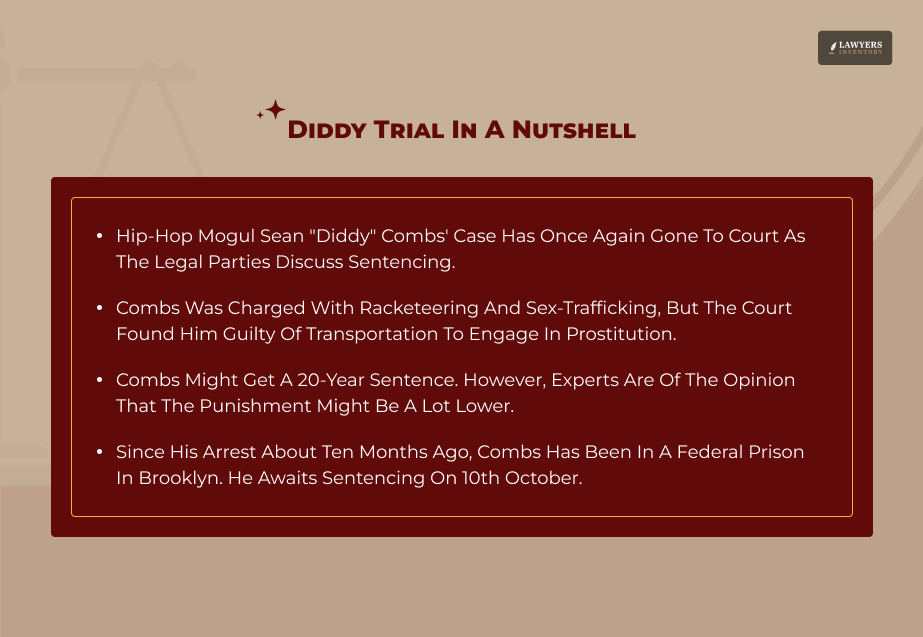
- Hip-hop mogul Sean “Diddy” Combs’ case has once again gone to the court as the legal parties discuss sentencing, following a jury’s mixed verdict in his trial last week.
- Combs was charged with and acquitted of the most serious counts: racketeering and sex-trafficking, but the court found him guilty of transportation to engage in prostitution.
- Combs might get a sentence of 20 years in jail; however, legal experts are of the opinion that the punishment will probably be a lot lower.
- Since his arrest about ten months ago, Combs has been in a federal prison in Brooklyn.
The criminal trial of Sean “Diddy” Combs has become one of the most-watched cases in entertainment law in recent memory.
Accused of racketeering, sex trafficking, and transportation for prostitution, Combs’ trial ended with a mixed verdict—acquitted on the more severe charges but convicted on two counts related to prostitution.
As he awaits sentencing on October 3, 2025, the outcome raises pressing questions about his legal fate, career trajectory, and legacy.
Background of the Diddy Trial

In mid-2024, federal agents raided several of Combs’ properties, seizing electronic devices, alleged narcotics, and other materials relevant to an investigation led by the Southern District of New York.
Combs was subsequently indicted on charges including racketeering conspiracy, sex trafficking by force, fraud, or coercion, and transportation to engage in prostitution.
He pleaded not guilty and was denied bail multiple times, largely due to concerns over witness intimidation and demonstrated violent behavior.
The trial began on May 5, 2025, before Judge Arun Subramanian.
Key Evidence and Allegations
The prosecution presented a depiction of Combs leveraging his celebrity and business network to orchestrate coerced sexual encounters, including staged “freak-offs” involving escorts, drugs, and filming for his “hotel nights.”
Alleged victims, including ex-girlfriend Cassie Ventura and another known only as “Jane,” were central to the allegations.
In contrast, the defense portrayed these relationships as consensual – even if “toxic” – and dismissed the charges as exaggerated attempts to capitalize on his fame. They even framed private “freak-off” videos as protected personal expression.
Verdict and Sentencing Outlook
On July 2, 2025, after roughly three days of jury deliberation, Combs was acquitted of racketeering conspiracy and sex trafficking but found guilty on two counts of transportation to engage in prostitution—each potentially carrying up to ten years’ imprisonment.
Immediately following the verdict, Judge Subramanian denied bail, citing Combs’ documented propensity for violence, particularly a 2016 hotel security video showing a domestic assault on Ventura, and ongoing safety concerns.
Additionally, Subramanian also stated that “It is impossible for the defendant to demonstrate… that he poses no danger to the community.”
A sentencing date was set for October 3, 2025. The judge asked both sides to submit sentencing information by September 1, comparing Combs’ case with others convicted solely on Mann Act violations and with no prior criminal history.
According to ABC News, “Combs got down from his chair and knelt on the floor after the verdicts were read, appearing to pray while some of his attorneys embraced. Marshals then escorted Combs out of the courtroom while some spectators in the gallery cheered and applauded.”
How Much Prison Time Is Diddy Facing?
As reported by the BBC, the act of transportation for prostitution should be punished with a maximum term of 10 years in prison. And Combs was convicted of two counts.
Prosecutors are requesting a sentence of about five years, while Combs’ lawyers are anticipating 21 to 27 months of discharge.
These were the first ideas that the judge received in letters sent on the day of the verdict, so it is possible that we get different numbers in court today.
Combs is being held at the Metropolitan Detention Center in Brooklyn, New York, since his arrest on September 16, 2024.
The beginning of any prison sentence will most probably be counted off from the time he has already been in custody.
Immediate Impact Of Diddy Trial On Career & Reputation
Right after the verdict, Combs received a standing ovation from fellow inmates—a symbolic acknowledgment of beating a powerful state entity.
However, his public and professional support has noticeably frayed. Several industry insiders now describe his brand as “radioactive,” with many unwilling to associate with him professionally—even as he expresses optimism about a post-prison comeback.
His legal team is also exploring strategies to avoid prison—presenting a redemption plan where Combs would become an anti-domestic abuse advocate, while seeking a sentence of time served.
For instance, in an interview, Diddy’s defense lawyer, Alexandra Shapiro, stated that Combs desires to collaborate with domestic violence programs “to help in whatever ways he can to kind of encourage other people not to do this and really to help in positive ways in the future.”
Apart from that, the defense emphasizes rehabilitation efforts, including counseling and recovery from substance issues.
Legal Context & Civil Litigation
Combs has been sued in conjunction with overlapping civil lawsuits, several of which go back to the 1970s and contain claims of sexual assault and abuse, mainly from Ventura and other individuals who lived between 1991 and 2009.
The event of a criminal conviction, though for minor charges, will most probably support the plaintiffs in their civil suits as the standard of proof required in civil cases is lower, i.e. only a “preponderance of evidence.”
Celebrity, Power, and Accountability
The court case is bringing to light the broader issues of the dichotomous nature of the celebrity and his privilege versus the need for his accountability.
A star can be beneficent in regard to the legal aspects of a person. Still, it can also exacerbate the negative aspects, as the tension that was found in the current case is not far from other instances during the #MeToo era.
The split verdict underscores the difficulties that such cases have in being successfully prosecuted, as these issues deal with power relations, use of force, and the limits of voluntary giving of consent.
The usage of liberty clause in the First Amendment by Combs as an example of expression through “freak-offs” being a private video portrayal shows the changing position of law relating to consent, art, and expression.
Public & Cultural Reaction
The reaction of the celebrity community has been diverse. Kid Cudi was compelled to testify under subpoena. He later stated that he had felt relief in siding with Ventura, yet calling the ordeal frightful.
On the one hand, social media is thoroughly polarized. On the one hand, some argue that Combs is guilty, while on the other hand, some accuse the system of going too far and being driven by jealousy of Combs’ fame.
The controversy has inflamed issues related to racial prejudice and whether Black people in power are more susceptible to becoming targets of high-profile cases.
Read Also:
- Karen Read Case: The Sensational Massachusetts Murder Case That’s Up for a Retrial
- Dapper Development Lawsuit: What It Means and Why It Matters
- What Does the Legal Phrase ‘Objection Hearsay’ Really Mean?










0 Reply
No comments yet.